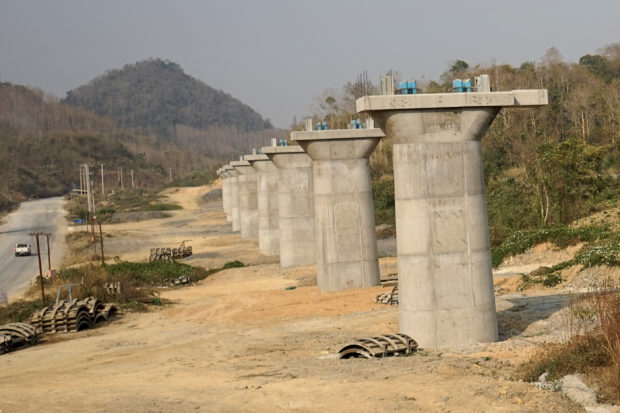‘Game changer’: Laos opens Chinese-built railway line

This picture taken on February 8, 2020 shows a part of the first rail line linking China to Laos, a key part of Beijing’s ‘Belt and Road’ project across the Mekong, in Luang Prabang. (AFP)
BANGKOK, Thailand – Laos is set to open a $6 billion Chinese-built railway on Friday, with debt concerns balanced against hopes it could boost the reclusive nation’s struggling economy.
The 414-kilometre (260-mile) route took five years to construct under China’s trillion-dollar Belt and Road Initiative.
Analysts have acknowledged the potential economic boost, but have queried how infrastructure-poor Laos will pay its $1.06 billion debt — and whether it is ready to exploit the state-of-the-art transport system.
But Chinese foreign ministry spokesman Wang Wenbin said Wednesday the “flagship project” would give a “boost to Laos’ strategy to convert itself from a landlocked country to a land-linked hub”.
President Thongloun Sisoulith is expected to hold virtual talks with Chinese President Xi Jinping on Friday, with both expected to deliver speeches at the official opening ceremony.
Article continues after this advertisementThe route will connect the Chinese city of Kunming to the Laotian capital Vientiane, with grand plans for high-speed rail to ultimately snake down through Thailand and Malaysia to Singapore.
Article continues after this advertisementThe communist-run country of 7.2 million people previously had only four kilometres of railway tracks.
But now sleek red, blue and white bullet trains will speed along the new line at up to 160 kmh (100 mph), passing through 75 tunnels and across 167 bridges, stopping at 10 passenger stations.
Passenger services are expected to begin on Saturday, state media reported, although only for those fully vaccinated.
‘Game changer’
Laos took a battering in the pandemic with economic growth declining to 0.4 percent in 2020, the lowest level in three decades, according to the World Bank.
Hopes for a 2021 rebound were dashed when the country locked down as it registered more than 76,000 infections in the past eight months.
The railway could boost Laos’ economy, but the government needed to undertake substantial reforms — including improving its border management systems, a World Bank report noted.
But the project could be an economic “game changer”, according to Bangkok Bank chief economist Burin Adulwattana.
“I don’t look at it as China trying to bankrupt Laos… it’s not a Trojan Horse strategy. I think it’s going to be a win-win situation,” he said.
But there is little transparency around how Laos will fund its debt, Australian National University lecturer Greg Raymond said.
A World Bank report noted “funding of the existing public infrastructure program looks increasingly unsustainable”.
Raymond noted the railway is a huge test for the country’s mostly agricultural subsistence-based economy, which doesn’t have a big merchant class.
“The issue for Laos is whether their economy… their private sector is positioned to take advantage of this transport system,” Raymond told AFP.